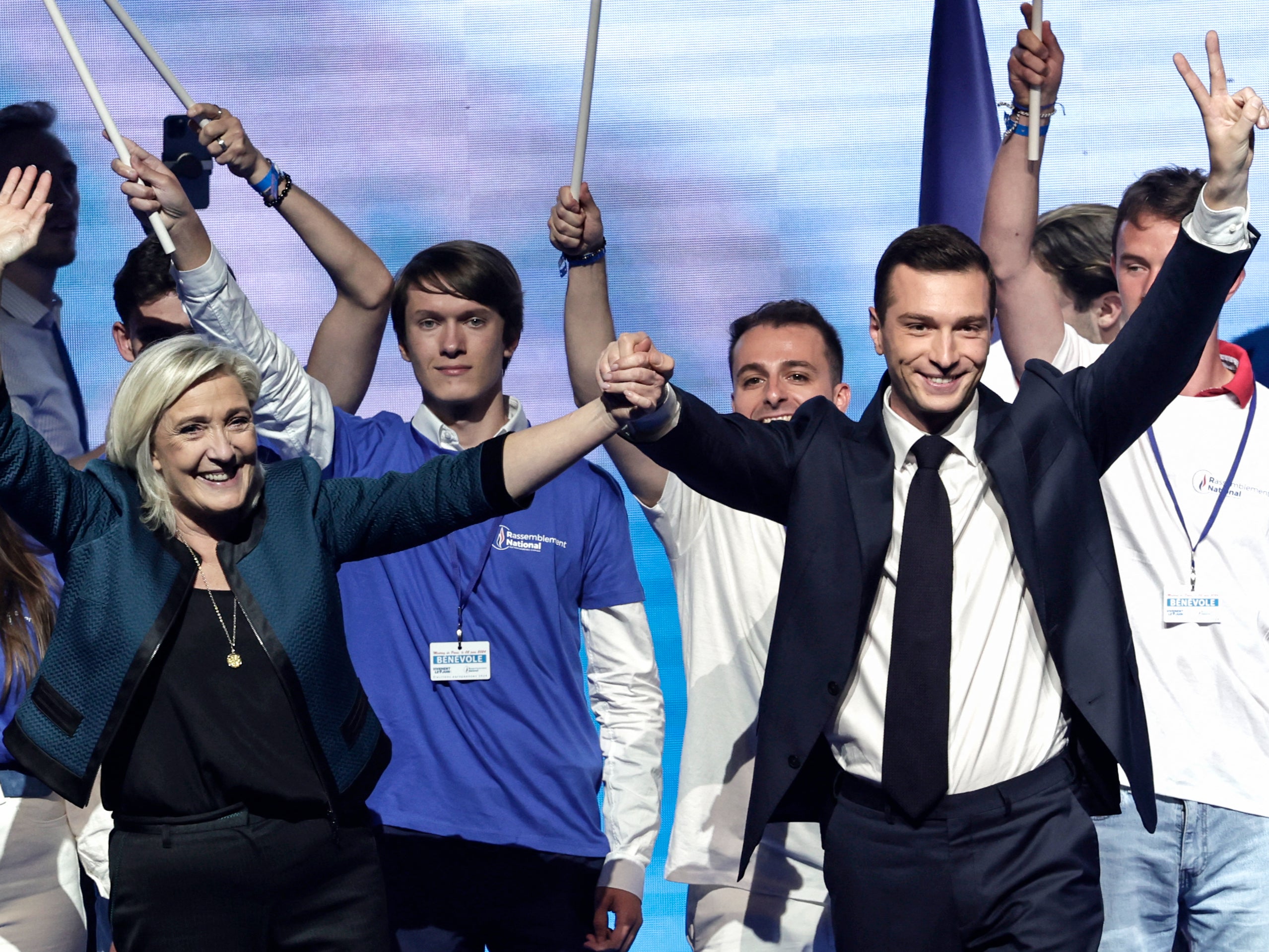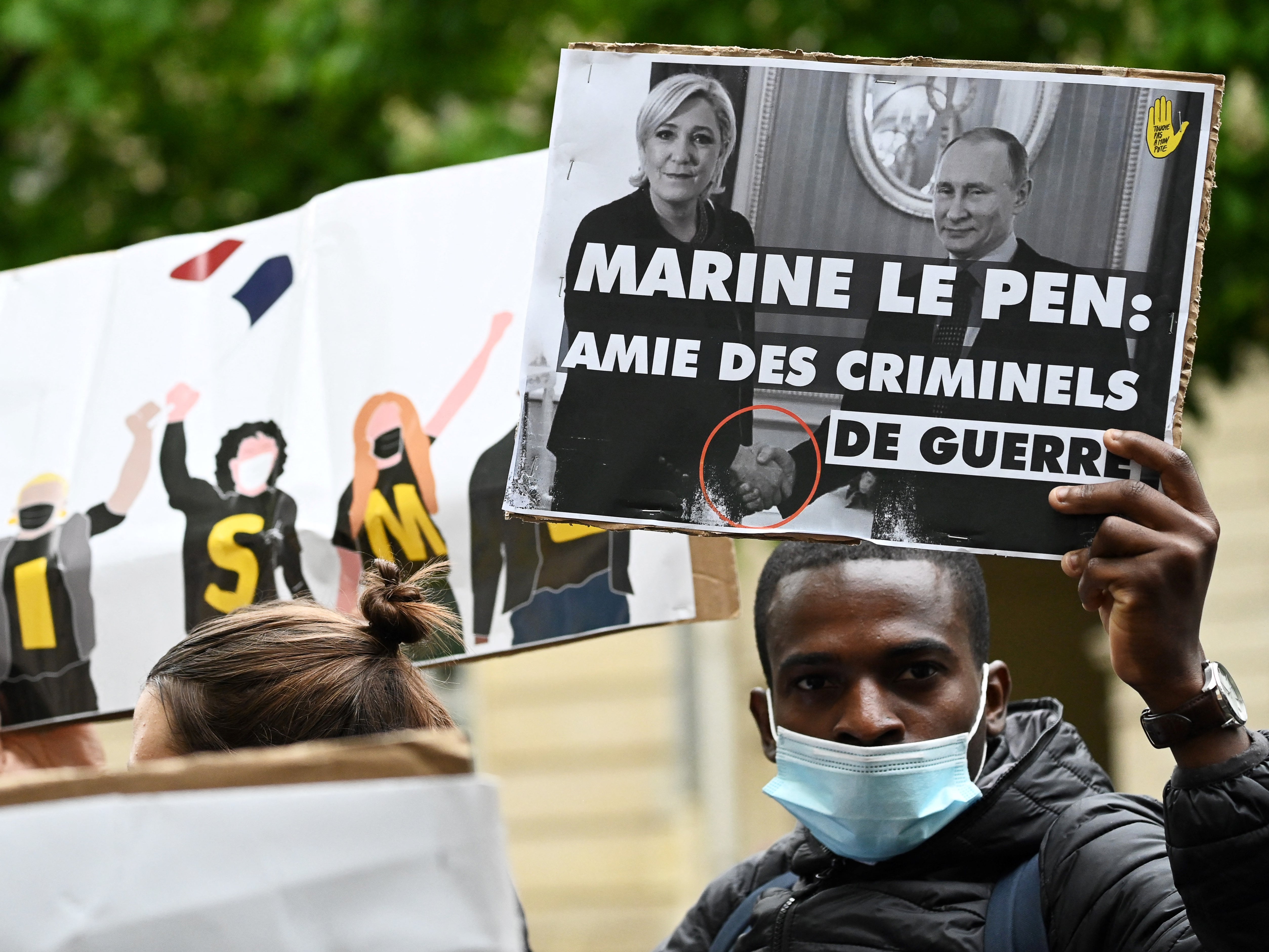The run-off in the French parliamentary elections this Sunday could install the country’s first far-right prime minister after a huge surge in support in the first round of voting. A majority for the National Rally (RN) party, led by Marine Le Pen, would be a political earthquake felt all over Europe and beyond.
The other, less frightening, scenario is a hung parliament between the left coalition’s New Popular Front (NFP), the RN and a reduced centrist party of Emmanuel Macron.
The chances of this appear to have increased since candidates from both the president’s Renaissance party and the NFP made tactical withdrawals on Tuesday in favour of the candidate with the best chance of winning.
Whatever happens, France is poised to enter a period of so-called cohabitation, where the president and prime minister are from opposing parties. This will have far-reaching and worrying implications for France’s foreign and defence policy, most importantly and immediately with regards to Ukraine and Russia.
The constitution says that foreign and defence policy is the reserve of the president, but the prime minister retains control of defence spending. It is almost impossible to imagine, therefore, that the president could pursue a foreign policy that is diametrically opposed to the government’s wishes.
A hung parliament would likely be paralysed in foreign policy matters, with the left divided over what stance to take on Ukraine. That would be difficult enough. But a majority of the far right would launch France into uncharted waters with a president and prime minister at loggerheads over aid to Ukraine and the long-term relationship France should pursue with Russia.
At the beginning of the war, president Macron was almost a Putin apologist insisting that Russia should not be humiliated as he engaged in a series of phone calls with the Russian leader in an effort to keep dialogue open. Macron eventually emerged as one of Europe’s most unambiguous defenders of Ukraine, even refusing to rule out the presence of French troops on the ground, and announcing in June 2024 that France would send mirage fighter jets to Ukraine.
If the National Rally emerges with a majority, its presumptive prime minister, 28-year-old Jordan Bardella, insists that France will continue to support Ukraine, but he has ruled out sending more long-range weapons and is adamant that there will never be any French troops on the ground.
General Michel Yakovleff, a French general who is the former deputy chief of staff at SHAPE (Supreme Headquarters of Allied Power Europe), tells The Independent that this would not change much in the near term as France is running out of the long-range SCALP missiles it has sent to Ukraine, and Macron’s comments on troops on the ground have been vastly exaggerated. “France will be less supportive, but it doesn’t mean it will stop supporting Ukraine,” he says.
open image in gallery
Demonstrators standing on the Monument a la Republique after the first round of parliamentary elections (AFP/Getty)
Bardella’s newfound support for Ukraine reflects polls that consistently show that the French support sending aid to Ukraine, even if support has diminished since the launch of the full-scale invasion.
They are also clearly an attempt to rid the RN of the toxicity of its links to Russia. These date back to the 1990s when the party’s founder, Jean-Marie Le Pen, was a frequent visitor to Moscow, where he befriended Russian nationalist politicians such as Vladimir Zhirinovsky and Sergey Baburin.
In 2014, after Russia’s annexation of Crimea, the National Rally accepted a €9m loan from an obscure Russian bank that ended up linking the party to Russian organised crime and the military.
In 2017, just before the French presidential elections, the party’s candidate Marine Le Pen, daughter of Jean-Marie, was received by Putin in Moscow.
The French newspaper Le Monde described this visit as the Russian president’s endorsement of Le Pen. Then, in 2019, a senior member of the National Rally, MP and now MEP Thierry Mariani, headed a delegation of French politicians to Crimea to celebrate the five years since the peninsula’s annexation by Russia.
open image in gallery
Le Pen with Jordan Bardella, who looks set to be France’s next prime minister (AFP/Getty)
According to the French investigative outlet Mediapart, former National Front (as the National Rally was then called) MEP Jean-Luc Schaffhauser allegedly received payments from Russia in return for promoting pro-Russian positions in the European Parliament.
The Russian loan was repaid early in 2023, and in an effort to cleanse its image, the party claims to have cut all ties to Russia. Nevertheless, a number of candidates on the ballot sheet for Sunday are reputed to have close links to the Kremlin and at least two have them have been election observers in Russia in 2018 and during the 2020 referendum.
Earlier this week, the Russian Ministry of Foreign Affairs tweeted its support for RN, writing on X/Twitter: “The people of France are seeking a sovereign foreign policy that serves their national interests and a break from the dictate of Washington and Brussels,” alongside a picture of Le Pen.
During the 2022 presidential elections, Le Pen, who faced Macron in the second round, promised to take France out of Nato’s integrated command and to build constructive relations with Russia. Both these suggestions have since been dropped.
open image in gallery
A protester holds a picture of Le Pen’s 2017 meeting with Vladimir Putin (AFP/Getty)
But despite the recent about-turn by the RN on aid to Ukraine, it remains difficult to imagine how a party with such long-standing ties to the Kremlin could shed them all overnight. Fears will be heightened if civil servants close to the far right take up positions in key areas of national security and defence in France, EU institutions and Nato.
This is already visible in the new European Parliament, where General Christophe Gomart, former head of France’s military intelligence, was elected for the Republican party, formed by Nicolas Sarkozy.
Gomart, whose ambiguous views on Russia and Ukraine had already earned him the distrust of pro-Ukrainians, has decided to join renegade Eric Ciotti, a former Republican politician who has defected to RN. Gomart has now been nominated to the European Parliament’s defence committee.
“Don’t let the wolf into the manger,” warns Denis Kataev, a Russian exiled journalist who compares the National Rally to Putin’s image as a committed liberal democrat when he was elected in 2000.
As France goes to the polls this Sunday, it remains to be seen how seriously this warning will be heeded. Even in the best-case scenario, France’s aid to Ukraine will likely suffer, and it is hard to see how either outcome is anything but a victory for Moscow.
Samantha de Bendern is a political commentator and associate fellow on the Russia and Eurasia Programme at Chatham House
Author :
Publish date : 2024-07-06 05:00:00
Copyright for syndicated content belongs to the linked Source.
Author : love-europe
Publish date : 2024-07-06 17:48:05
Copyright for syndicated content belongs to the linked Source.

